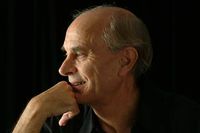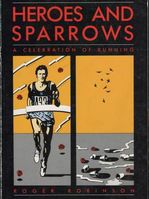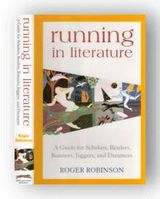Roger Robinson - The Author on Running
Roger Robinson On Running
Roger Robinson's lifelong writings about running have made him one of the sport's most admired authors internationally. He has received three American writing awards, one of his books was a national literary finalist in New Zealand, and several of his pieces were selected for the New Zealand Book of Sports Writing (2010). His passion for running is matched by long experience in many aspects of the sport and deep knowledge of its history, all put across in his famously witty and entertaining prose. Above all, readers enjoy Roger's expressions of what running means: its significance to each runner and to the modern world.
For his most recent running publications. See also www.runningtimes.com, Search "Roger Robinson."
Roger comments:
"I believe, simply, that running is important and interesting enough to deserve the best possible writing. It can be as hard to write a good article as to run a good race, but there is the same joy in doing it well."
Reviewers have described his writing as eloquent, enjoyable, entrancing, vivid, original, poetic, crackling with wit and intelligence, and praised the wonderful, easy, conversational erudition, a tour de force of scholarship and creative writing. The consensus is that his work reaches a level rarely seen in sports writing.
Regular readers agree:
"Roger Robinson's research and well-written articles are at a much higher level of writing about distance running. It is easy to read, and his tone adds light humor. I will index those two articles as serious sources of historical correctness..." (Richard Westbrook, letter to Marathon & Beyond.)
"We are fortunate to have Roger Robinson writing for our sport, be it cross-country, track or road racing. Robinson writes from a position of depth and breadth. He possesses a unique style, which often forces the reader to sit up and take notice. His historical perspective is valuable, aiding but not overpowering the reader. Bravo, Roger!" (David Abusamra, letter to Running Times.)
"I have read many accounts of Halberg's 1960 Olympic race, and yours is the best by far. It made me feel I was right there. Brilliant stuff." (Greg Lautenslager, American runner and novelist, Nelson, New Zealand)
"Your two 'Roger on Running' pieces were superb. I read the Christchurch one to Lizzie, and it left us both choked up." (George Knowles, Toronto).
Journalism and Heroes and Sparrows
Roger recalls:
"I first wrote about running as a teenager, in school and club magazines, and quickly graduated to being a freelance running and track writer for area newspapers wherever I lived. By the early 1970s, while a hard-working faculty member at University of Canterbury, New Zealand, I was also writing in the sports pages of the daily Christchurch Star, learning about word-length and deadlines and how to make every story interesting for the ordinary reader."
"In 1980 (by now a full professor and Head of Department at Victoria University of Wellington) I joined an outstanding team of freelance writers assembled by editor/publisher Tim Chamberlain for New Zealand Runner magazine, writing features and a regular column. I covered many aspects of running, unpredictably and sometimes satirically. That work kept a big readership, through several changes of editor, for 25 years. It was a good way of contributing to a country and a sport that had made me so welcome. My obituary assessment of the significance of Arthur Lydiard was in the magazine's final issue, the last of well over 200 contributions."
Many of Roger's New Zealand Runner pieces went into Heroes and Sparrows: a Celebration of Running (1986), but that did not prevent the book from finding an enthusiastic readership in America, as well as being nominated for New Zealand's annual book awards. It has often been selected as a classic of the sport.
As soon as Roger (now a world-leading masters runner) began to race in America, in 1980, he also began to write about it, and before long his work was appearing frequently in Runner's World and Running Times, and occasionally in the New York Times and various race programs. In the 1990s, he became a regular contributor to Running Times, and was appointed senior writer in 2001.
Roger comments:
"It's a privilege and a lot of fun to be on the team at 'Running Times,' because it is aimed at runners who believe running is worth thinking about, and who enjoy expert and lively writing about the sport."
He has also contributed frequently to New York Runner, and to Marathon & Beyond, and was M&B's "On the Road" columnist in its second year. In New Zealand he writes regularly for VO2Max.
Running in Literature & 26.2 Marathon Stories
Roger's second running book, Running and Literature (2003), brought together two of his passions, in a work of ground-breaking sports literature scholarship and vivid writing.
"A veritable encyclopedia for our enjoyment and instruction", wrote Boston legend and revered English teacher, the late John J. Kelley.
Running and Literature has become a favorite with runners who read, as well as an important source for people interested in sports literature and sports history.
Roger and his wife, women's running pioneer Kathrine Switzer (www.kathrineswitzer.com) were then commissioned to write the words for the lavishly illustrated 26.2 Marathon Stories (2006). It became one of the sport's most loved and inspiring books. Roger's expert but concise historical material and notes on great runners provide the best short introduction to the marathon available, and his five chapters that take the reader inside the mind of a runner at various stages of a marathon strike chords of recognition.
Roger's two decades of contributions to running journalism in America were recognized when he received the Sheehan Award in 2007. In the same year his book on Robert Louis Stevenson was a finalist in New Zealand's literary awards, an unusual double.
Magazines and movies
Always interested in the history of running, in 2008 Roger began a monthly Running Times column, "Footsteps." (www.runningtimes.com)
From the unknown beginnings of women's cross-country, to the pre-history of running in Africa, "Footsteps"
has already contributed to areas of running history that no one else has even thought about. Samples can be read on this website under Archives.
Roger was the script-writer and on-camera expert for the TV documentary on the history of the marathon, A Hero's Journey. He also appears as expert historian in the documentary feature film Spirit of the Marathon (www.marathonmovie.com), and a BBC docu-drama on the 1908 Olympics.
He often contributes to other books about running. He provided introductions to the life of Derek Turnbull, The Fastest Old Man in the World , and to Running in the Zone: a Handbook for Seasoned Athletes. He researched and wrote essays in the Boston and Columbus Marathon special issues of Marathon & Beyond. He helped to edit Katherine Switzer's best-selling Marathon Woman (which is dedicated to him).
He also writes about running subjects in scholarly contexts. He researched and wrote entries on sport and sports writers in the Oxford Companion to New Zealand Literature, and essays like "Literature, Journalism and Sport," in the book Sport, Society & Culture in New Zealand. He has published extensively on Jack Lovelock, notably in the British and New Zealand Dictionaries of National Biography, and the research essay "The Life and Opinions of Jack Lovelock."
Another key interest is the role of running in the environment. Roger has become a major advocate, arguing that the running industry should take "creative initiatives," in articles in Running Times, New York Runner, and in New Zealand.



















































